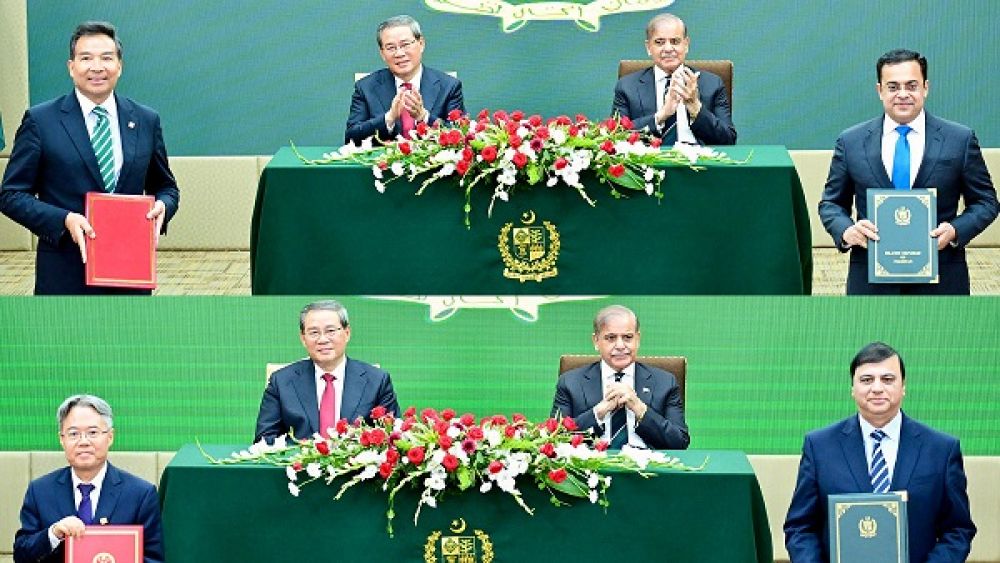The Road to Pakistan's Economic Revival Lies in Its Skilled Workforce - Prof Ahsan Iqbal Chaudhary
Posted 1 year ago
Pakistan's Federal Minister for Planning and Development, Prof. Ahsan Iqbal Chaudhary, unveiled an impressive plan to double the country's annual remittances to $60 billion by focusing on an often-neglected resource: its labor force. Chairing a meeting of the Taskforce on Human Resource and Skill Development in Islamabad, Iqbal spoke about the transformative power of skilled labor in propelling Pakistan toward economic stability and international competitiveness.
Pakistan receives around $30 billion annually in remittances from expatriates, a figure that Iqbal confidently claims could be doubled. His optimism is fueled by the notion that strategic investment in human capital will create a workforce tailored to international demands, particularly in sectors like mining, agriculture, manufacturing, and services. Federal Minister Prof. Ahsan Iqbal believes this human resource can fuel Pakistan's economic turnaround, positioning the country as a major player in the global market.
Prof. Iqbal recognizes this opportunity and associated challenges. According to him, a comprehensive overhaul of its vocational and technical education systems. A series of presentations during the meeting highlighted the scope of this challenge. Prof. Dr. Mukhtar Ahmad, Chairman of the Higher Education Commission (HEC) Pakistan, discussed the need to reorient higher education toward skilling graduates for practical work, focusing on the mining sector, a critical area for Pakistan's economy. Meanwhile, the Secretary of the Ministry of Federal Education and Professional Training, Mr. Mohyuddin Wani, emphasized his ministry's ongoing efforts to enhance skills education nationwide. In this meeting, the Executive Director of the National Vocational and Technical Training Commission (NAVTTC), Mr. Aamir Jan, stressed the importance of data-driven approaches to vocational training.
To meet defined goals for improving the skilled workforce, Prof. Ahsan Iqbal Iqbal directed NAVTTC to accelerate the development of certified training programs that adhere to global standards. These programs are essential to equipping Pakistan's workforce with the necessary skills and elevating the country's international reputation as a hub for high-quality labor. The minister's vision is clear: Pakistan's human resource development must prioritize sectors with export potential, ensuring the workforce is trained to meet the evolving demands of the global market.
While the immediate focus lies on enhancing technical skills, Prof. Iqbal noted that Pakistan's future success hinges on a more holistic approach to labor development. He emphasized the need to cultivate integrity, emotional intelligence, and a strong work ethic among workers, which would bolster Pakistan's standing on the world stage. To shape a workforce capable of thriving in local and international markets, Prof. Iqbal called for identifying key manufacturing clusters, particularly in textiles, automotive, sports, surgical goods, and pharmaceuticals. Universities, he argued, must align their programs with the needs of these industries to ensure that Pakistan can compete in the global export market.
Agriculture, too, was a central focus of the discussion. With Pakistan's agricultural sector facing mounting challenges, Prof. Iqbal underscored the importance of equipping workers with modern tools and techniques to enhance productivity. Horticulture, dairy, seed development, and drone technology were cited as key areas requiring skilled labor to support the future of Pakistani farming.
Prof. Dr. Muhammad Mukhtar, Vice Chancellor of the National Skills University Islamabad, praised Iqbal's leadership in advancing skill-based education and cautioned that Pakistan's workforce must keep pace with emerging technologies. Mukhtar proposed the creation of a body modeled after Singapore's SkillsFuture initiative, bringing together technologists, industry leaders, educators, and government officials to design forward-thinking reskilling programs. Such an organization would monitor global trends and ensure Pakistan remains ahead in the race to adapt to new technological demands.
The task force meeting drew attendance from high-level officials, including Rector NUTECH Lt. Gen. (R) Moazzam Ejaz; IG Motorway Police and representatives from the Ministry of Science and Technology, the Federation of Pakistan Chambers of Commerce and Industry (FPCCI), and other relevant stakeholders. Their presence underscored the importance of collective action in tackling Pakistan's human resource challenges.
The Federal Minister's vision, while bold and doable. The government must swiftly implement a robust strategy to align Pakistan's workforce with current and future global requirements. He has demanded a comprehensive plan within 15 days outlining practical steps to elevate Pakistan's labor market. If successful, this initiative could improve the country's economic standing and reshape its global image as a nation that delivers on its promise of skill, integrity, and innovation.
Pakistan's future depends on its ability to equip its workforce with the skills to thrive in a rapidly changing world, and this initiative is a bold step in the right direction.





